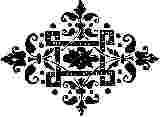
Part III
Verse
7
"And there was war in heaven: Michael and his angels
fought against the dragon; and the dragon fought and his angels." |
One thing is instantly observable here. If Jesus is
"Michael" of this verse, where could we find justification in Scripture to
indicate that he fought for a place of authority in the ruling heaven? Never did
Jesus fight for any position in heaven or on earth.
He submitted to crucifixion and death so easily that even his enemies
were surprised at how easily he fell before them. He refused to defend himself before
Herod or Pilate, but as a sheep, he silently gave himself up to the slaughter. Where was
the warfare? It never happened!
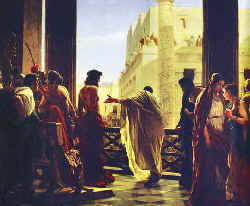
"Behold, The Man"
|
The "dragon" (Satan) easily secured
Jesus’ death when the appointed time came. Did not Jesus say in John 10:18: "No
man taketh it [my life] from me, but I lay it down of myself."
Again we ask, Where was the warfare? Jesus was never accepted in the
Jewish spiritual ruling arrangement.
However, there was warfare, and "Michael and his angels"
fought against the "dragon and his angels" and vice versa. The
"dragon" and this "Michael" were going at it, vying for position. That
hardly pictures our Lord and the "dragon" locked in combat.
Everything our Lord received came from the Father with love. Never did
he want anything except what God would give him. He wrested nothing from the
"dragon." This whole scenario is unthinkable to apply to our Lord Jesus at any
stage of his life here on earth.
We note that both "Michael" and the "dragon" had
"angels" on their side, also being pictured as locked in this grab for control
of "heaven," the spiritual realm. It is important to understand that our Lord never fought for control
of the "Jewish heavens." He told the people that the scribes and Pharisees
"sit in Moses' seat." He said in Matthew 23:2, 3:
"The scribes and the Pharisees sit in Moses' seat:
"All therefore whatsoever they bid you observe, that observe and do; but
do not ye after their works: for they say, and do not."
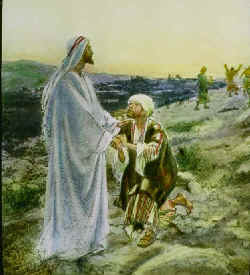
Jesus told the lepers
to show themselves to the Priests to be pronounced "clean."
|
Where is this war in heaven touching our Lord? He
encouraged the people to observe what their religious leaders enjoined upon them.
However, when we apply this text properly to the man of sin
"Michael," this text fits like a glove. The bishops were clawing and struggling
among themselves to gain ascendancy within their ranks to gain the papal seat controlling
"heaven." As they contended for preeminence among themselves they also battled
with vigor against the "dragon" (civil power) controlling their inner circle of
"heaven."
Clearly, they did not want the "dragon" emperor to be their
Pontifex Maximus. They wanted at last to crown the winner within their ranks as the
"bishop of bishops," the pope. They succeeded in ousting the "dragon"
from control of the religious realm by a fortuitous circumstance.
When Julian, a noble pagan, abandoned leadership in the Christian
heavens, wanting rather to mall it than to join it, it enabled them to lock out the
emperor from being Pontifex Maximus. That is basically where the "dragon"
prevailed not. Julian died after only a short reign, but that brief interlude in which
they were not persecuted by the emperor to control them, gave the "Michael and his
angels" the momentum for victory.

Verse
8
"And prevailed not; neither was their place found any more
in heaven." |
Alas for the "dragon," his Pontifex Maximus reign in the
Christian spiritual realm was very short. The "dragon" would still control the
emperors of the "earth" as well as the "popes" of the spiritual
Christian realm. The same ambitions, cruelty, pride and vanity gave Satan controlling
leverage over both emperors and popes.
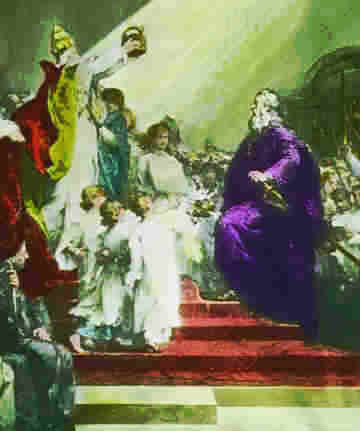
Pope crowning Charlemagne Emperor |
If both emperors and popes were in the "dragon’s" power, why the struggle?
The answer is simple.
It is hard to synchronize the interests of emperors and popes
conveniently.
Sometimes their interests conflict.
It made Satan’s control less efficient. |
We read of the Church of Pergamos in Revelation 2:13: "I know thy
works, and where thou dwellest, even where Satan’s seat is." Satan still had and
has enormous control over the spiritual "heaven" and civil "earth." He
just lost ease of operation and efficiency in this battle.
Democracies are even harder to control. The more people who are
involved and the more interests that conflict, the harder it is for Satan to accomplish
his purposes.

Verse
9
"And the great dragon was cast out, that old serpent, called
the Devil, and Satan, which deceiveth the whole world: he was cast out into the earth, and
his angels were cast out with him." |
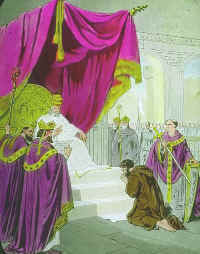
King Louis doing penance
before the Pope.
The "state" became
subservient to the Pope. |
The emperor and his retinue of civil officers lost their unique ruling status in the
"heavens."
They were cast to "earth" where they belonged in the first
place.
Separation of church and state is excellent in an evil world.
However, in the
Kingdom of Christ, his reign will be
unchallenged.
Christ will have all "power in heaven and earth," all from
one throne. There will not be a competitive or divided ruling authority.
This is really what Satan wanted, but was denied. |
Remember, however, Satan only lost efficiency of operation, he did not
lose control. He thenceforth had his ducks lined up into two columns, and not the one
column he desired.

Verse
10
"And I heard a loud voice saying in heaven, Now is come
salvation, and strength, and the kingdom of our God, and the power of his Christ: for the
accuser of our brethren is cast down, which accused them before our God day and
night." |
The victory of the papal forces in ridding themselves of meddling
emperors in their internal affairs and also of their religious conquest for the world
was attended with jubilation. The "heavens" were now under their control and
they could direct their attention to getting a better hold on earthly matters.
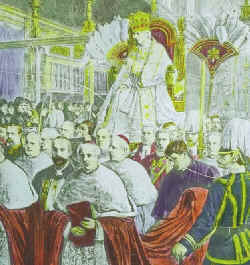
Coronation Celebration of the Pope
|
We notice something strange about this jubilant
declaration. There is no praise given to God or Christ. No, not one word of thanksgiving
to God or any acknowledgment of gratitude was given. Nor should it be, for God and Christ
had nothing whatever to do in this successful grab for power.
Jesus said, "The Son can do nothing of himself." (John
5:19) But the claim is made that "salvation, and strength, and the kingdom of our
God, and the power of his Christ" has been attained by the fact that the
"accuser of our brethren is cast down."
Please notice this proclamation is made because the
"dragon’s" control in the nominal spiritual heavens has been thwarted. The
"dragon" is not in the abyss. He still rules the civil governments of earth. And
without a doubt he still has the antichrist under his influence, albeit he needs two hats
to run the split powers of "heaven" and "earth."
Edward Gibbons, Esq., in
THE HISTORY OF THE DECLINE AND FALL
OF THE ROMAN EMPIRE,
Vol. II, p. 41 (in the Chicago Bible Students' disk on
Gibbons, the footnotes are not provided, so the pages are 31, 32), in evaluating the
tendency of Christians to seek martyrdom observes:
"The first Christians, who, according to the lively expressions
of Sulpicius Severus, desired martyrdom with more eagerness than his own contemporaries
solicited a bishopric. The epistles which Ignatius composed as he was carried in chains
through the cities of Asia, breathe sentiments the most repugnant to the ordinary feelings
of human nature.
"He earnestly beseeches the Romans, that when he should be exposed in
the amphitheater, they would not, by their kind but unseasonable intercession, deprive him
of the crown of glory; and he declares his resolution to provoke and irritate the wild
beasts which might be employed as the instruments of his death.
"Some stories are related of the courage of martyrs, who actually
performed what Ignatius had intended; who exasperated the fury of the lions, pressed the
executioner to hasten his office, cheerfully leaped into the fires which were kindled to
consume them, and discovered a sensation of joy and pleasure in the midst of the most
exquisite tortures.
"Several examples have been preserved of a zeal impatient of those
restraints which the emperors had provided for the security of the church. The Christians
sometimes supplied by their voluntary declaration the want of an accuser, rudely disturbed
the public service of paganism, rushing in to pronounce and to inflict the sentence of the
law.
"The behavior of the Christians was too remarkable to escape the notice
of the ancient philosophers; but they seem to have considered it with much less admiration
than astonishment. Incapable of conceiving the motives which sometimes transported the
fortitude of believers beyond the bounds of prudence or reason, they treated such an
eagerness to die as the strange result of obstinate despair, of stupid insensibility, or
of superstitious frenzy."
This illustrates that the antichrist had martyrs during the pagan
persecutions which they could look back upon and choose whom they would as their
"brethren" who were being accused and martyred. It must be acknowledged that
while there were true Christians who were martyred, the antichrist had many people who
gladly and fanatically sought martyrdom.
We are not to think of the man of sin element as limited in its
roster of martyrs to fanatic examples. It claimed that all martyrs, starting with Christ
and the apostles on down through the terrors of Diocletian’s reign of terror, were
among its faithful who helped bring it victory. As Gibbon says in
THE TIME IS AT
HAND, p. 84:
"The Church of Rome defended by violence the empire which she
had acquired by fraud; a system of peace and benevolence [practiced by early Christians]
was soon disgraced by proscriptions, war, massacres, and the institution of the holy
office [of torture]."
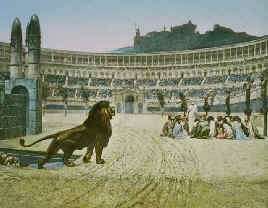
Persecution under Pagan Rome |
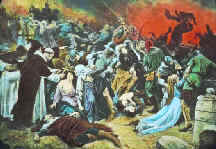
Persecution under Papal Rome |
Constantine ended the relentless persecution of
Christianity, allowing the man of sin forces to enrich and fortify their position and
ultimately to secure victory over the whole spiritual realm. While the early Christians
were non-violent martyrs, once the man of sin came to power it became more ruthless and
cruel than the worst performances of Diocletian.
We notice the false declaration of victory says: "Now is come
salvation, and strength, and the kingdom of our God, and the power of his Christ." We
notice this shameless proclamation attributing to God and Christ what in fact had been the
result of their own successful ascent to power in the control of the "spiritual
heavens."
Notice this man of sin class does not say we were "accused day
and night." No, these ruling princes were not the persecuted and martyred. They say,
"the accuser of our [deceased] brethren is cast down." They claim all the
martyrs, which at their discretion they chose to call their "brethren." How
convenient it was!

Verse
11
"And they overcame him by the blood of the Lamb, and by the
word of their testimony; and they loved not their lives unto the death." |
Please notice what this verse does not say—"we overcame
him [the dragon] by the blood of the Lamb, and by the word of our testimony; and we
loved not our lives unto the death."
The man of sin could sit smugly ensconced in glory having secured
"heaven" as its domain, and claim the faithfulness and martyrdom of others the
basis for their ascendancy. Nothing more needs to be said. This is a total lie.
The man of sin got where it was by compromise, intrigue, deceit,
duplicity and flagrant abuses of Christian values. The martyrs suffered. The man of sin
element, more often than not, made others suffer.

Verse
12
"Therefore rejoice, ye heavens, and ye that dwell in them.
Woe to the inhabiters of the earth and of the sea! for the devil is come down unto you,
having great wrath, because he knoweth that he hath but a short time." |
Something is very wrong about this declaration. It is transparently
a pathetic lie. Where will the devil be when Christ takes control of the heavens? He will
be in the "bottomless pit." (Revelation 20:2, 3) The devil will not be around to
trouble anyone, no matter how angry he might be, for he will be absolutely restrained in
the "pit."
This text sends up all kinds of signals of its deception. There is no
proof that because the "devil is come down unto you" that the "inhabiters
of the earth and of the sea" were any worse off. It was always difficult being under
the rule of the "devil." The only one seemingly singled out for persecution was
the "woman."